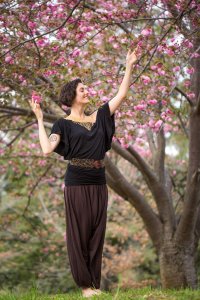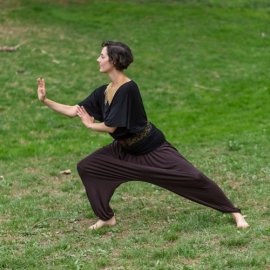
 Photo by Taylor Johnson
Photo by Taylor Johnson
With countless yoga classes being offered daily in studios and public spaces around Asheville and Western North Carolina, creative local yoga teachers are diversifying.
Xpress talked with six yoga teachers who have infused their yoga classes with complementary healing or movement practices to create a unique yogic experience. Virginia Rosenberg teaches dance, qi gong and yoga, and teaches a weekly qi gong and yoga fusion class at West Asheville Yoga.
Virginia Rosenberg — yoga and qi gong
GO WITH THE FLOW: Rosenberg brings together the ancient practices of yoga and qi gong in one flowing class. Photo by Taylor JohnsonXpress: How does qi gong feature in your yoga classes?
Rosenberg: Many people do not know that qi gong translates to mean energy work. Qi — or chi — refers to primordial life-force energy, known as prana, or kundalini in Hindu and yogic systems. Gong (also known as gung or kung) means cultivation, work or something you do through effort over time. … Sometimes I intersperse traditional qi gong sequences with sun salutations and hatha yoga asanas. I always infuse the practice with intentional awareness of subtle energy.
We maintain awareness at the lower dantian, also known as the lower burner in Chinese medicine. Regardless of gender, this is the womb space, our creative center directly at the midpoint of our bodies. As our awareness remains here, the energy is activated and flows from the center to our extremities and beyond.
 What makes these two modalities from two distinct traditions well-suited for each other?
What makes these two modalities from two distinct traditions well-suited for each other?
As spiritual practices, both yoga and qi gong have the same goal. Patanjali’s second yoga sutra states: “The restraint of the modifications of the mind-stuff is yoga.” Taoist alchemy is based on the practice of emptiness. Practicing emptiness brings us into direct experience. Yoga and qi gong are like two different paths leading to the same ultimate destination.
Physically and energetically, I have had very different experiences in yoga and qi gong. For me, yoga facilitates opening, purifying, cultivating mindful awareness, as well as developing strength, flexibility and balance. Qi gong facilitates subtle awareness, deep internal nourishment, developing gentleness, roundness, softness and integration. After I practiced qi gong for a number of months, practicing yoga without the nutritive energetic element felt incomplete.
Both forms of practice are amazing, beneficial and also have their risks. It all comes down to balance.









